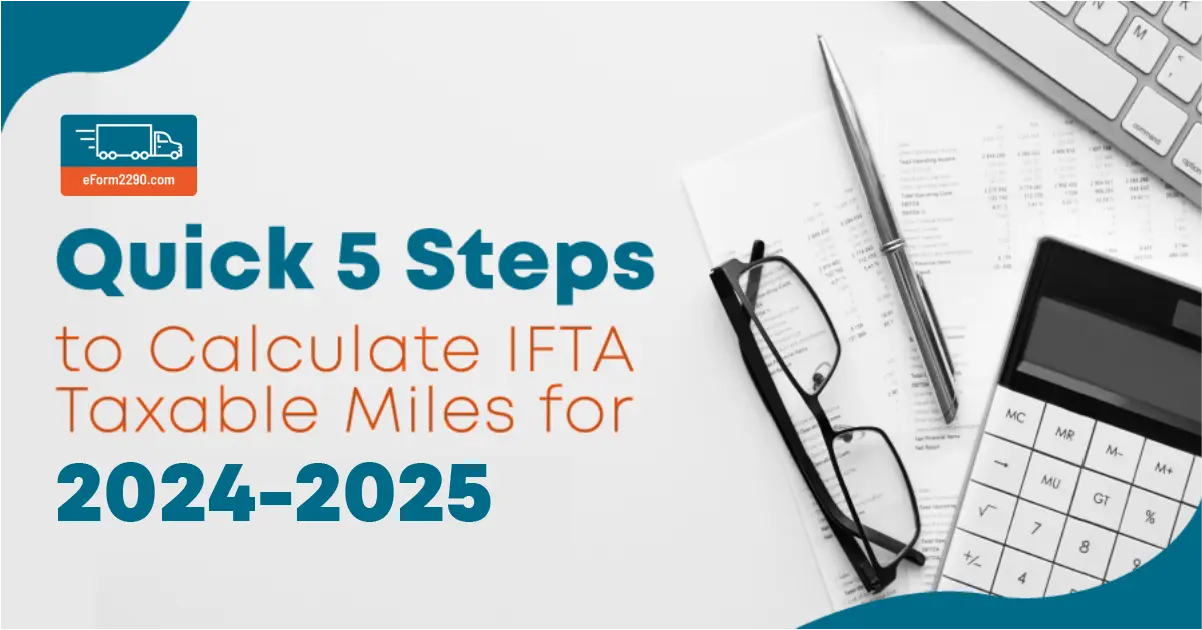IFTA Miles Calculator – How To Calculate Your Mileage and Fuel Taxes

What are IFTA Miles?
IFTA miles, or International Fuel Tax Agreement miles, encompass all miles or kilometers your vehicle travels within a quarter in each IFTA-only jurisdiction. This includes empty or deadhead miles, yard movements, trips to the mechanic shop, and personal conveyance miles.
A majority of the Canadian provinces and contiguous United States have co-signed the International Fuel Tax Agreement (IFTA) treaty. This treaty eases the fuel reporting process for both fleet owners and jurisdictions. However, as part of IFTA compliance, truckers are required to file IFTA taxes and reports every quarter. Moreover, a large part of this process entails recording both the miles traveled and fuel consumption per state.
You may need help to calculate miles for IFTA. So, here we have listed the three methods whereby you can calculate IFTA taxable miles for paying your taxes.
How Can Owner-Operators and Fleet Operators Comply with IFTA Rules?
Being a commercial owner-operator or a fleet operator you are required to register with IFTA to legally transport goods across inter-jurisdictional regions. You have to register your vehicle in their base jurisdiction or home state.
After getting approval, every registered vehicle receives an IFTA sticker plate (or IFTA license) and two IFTA decals. The expiry date of both decals is 1st January of the following year. Thereon, owner operators are required to submit IFTA reports and file taxes every quarter. The deadlines for submitting IFTA reports are: 30th April, 31st July, 31st October, and 31st January.
Read: 2290 Tax Calculator


Thus, if you do not file your quarterly IFTA return by the given deadline, they are granted 30 days to do the needful. If you fail to do so, even during this grace period, your driver's license can get suspended.
In addition to filing IFTA returns every quarter while adhering to IFTA guidelines, licensees have to maintain accounts of fleet activity for the past 4 years at least. Thus, you are expected to maintain records of the distance traveled by each vehicle, the quantity of motor fuel purchased (in gallons), and trip permits, among other things.
In the event that you do not comply with IFTA rules, you become liable for penalties, license suspensions, and fines.
How to calculate IFTA miles?
Before learning how to calculate IFTA taxable miles, you should know about IFTA fuel tax procedures. Remember that taxes are determined by the quantity of fuel consumed in each state.
It also helps to know that IFTA non-taxable miles refer to miles traveled in non-IFTA jurisdictions. The District of Columbia, Hawaii, Mexico, and Alaska are some of the non-IFTA provinces.
Now, to calculate the IFTA taxable miles, there are 3 methods that can be used.
First Method: Calculate Manually
Besides being a tiresome and time-consuming method, manual calculations are prone to human errors.
However, here are the things you need to calculate IFTA taxable miles manually:
Ø A detailed record of the miles covered in each state and province for the quarter
Ø Receipts obtained from fuel stations and depots
Ø The latest IFTA tax rates for the quarter
Thereafter, you may proceed with the following steps:
Ø Step 1: Calculation of IFTA mileage per state or province per trip
To do this, you have to record the odometer reading whenever they enter or exit a new jurisdiction and fill the fuel. The formula for this calculation is:
Miles traveled (State or Province) = Exit reading (State or Province) — Entry reading (State or Province)
Ø Step 2: Compute total mileage per state or province
During a quarter, you enter and exit a state many times. Hence, to calculate the total mileage traveled in a state, you have to add the mileage for all trips logged in the state for the given duration.
Ø Step 3: Sum up the total miles covered
Take a total of the number of logged miles for every state and province. Do this for all jurisdictions that you have operated within the quarter period.
Ø Step 4: Calculate your aggregate mileage
Only add up all the figures from Steps 2 and 3 to get the total miles traveled for the given quarter.
Second Method: Use a Trip Mileage Calculator
The Trip Mileage Calculator Method automates certain parts of manual calculation. Rather than tracking the odometer reading every time a truck enters, refuels, or exits, you can use a trip mileage calculator. By doing so, you can get a fair estimate of the miles driven in each state or province.
While using an IFTA mileage calculator, you should:
Ø Log into the system during every trip to have a record
Ø Make entries for the starting location and final destination. The system may also prompt for routing preferences for greater accuracy. After the route has been decided, details about the miles driven in each IFTA jurisdiction can be obtained.
Ø Use a spreadsheet to record the IFTA taxable miles
Ø Take a total of the miles traveled for each state or province
Read: How to File Form 2290?


Although an IFTA mileage calculator helps to automate some parts of the mile-tracking process, it requires some manual calculation. Nonetheless, drivers/fleet operators can make use of a fuel card to record the miles covered automatically and seamlessly.
You can train your truck drivers to swipe the fuel card for recording IFTA taxable miles. By doing so, the transaction is stored, categorized and logged in the system. After documentation, the reporting dashboard generates automated reports.
Conclusion
Calculating IFTA mileage manually can be a tedious task. Certainly, a trip mileage calculator helps to make life easier to some extent. Even so, fuel cards are your best bet to track the miles you cover in IFTA jurisdictions accurately.
Simply by swiping the fuel card at the different junctions, you can get a record of the miles traveled in each state and jurisdiction, which helps to calculate IFTA miles for IFTA tax preparation accurately and smoothly.